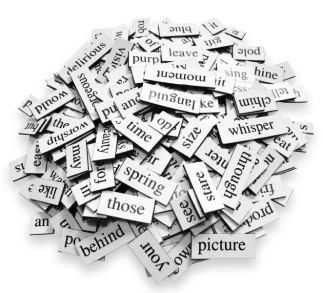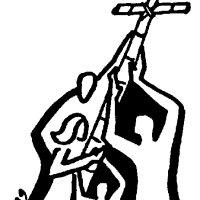I have been teaching my Public Speaking students about language, especially the great power of our words to create or destroy. Writers are always influencing by the words we choose to describe something or someone. I wonder if we are constantly conscious of what we are doing…. Do we always choose the word that is the clearest and most descriptive, and not a judgment? After all, readers are limited to the world we create, with its values and visions of what is–or could be–in it. Are we painting brave new worlds with our word pictures or are we prescribing a life that only gratifies or glorifies our self-centered natures? And are we conscious of the beauty and precision of the grammatical context of our words, or do our fingers go tripping and tumbling along a path, throwing commas and other punctuation wherever we please with no thought to scooping up the excess?
Here are some possible answers, quotes I found on Goodreads:
 “Don’t use words too big for the subject. Don’t say infinitely when you mean very; otherwise you’ll have no word left when you want to talk about something really infinite.” ― C.S. Lewis
“Don’t use words too big for the subject. Don’t say infinitely when you mean very; otherwise you’ll have no word left when you want to talk about something really infinite.” ― C.S. Lewis
“The limits of my language means the limits of my world.”― Ludwig Wittgenstein
“Words are like eggs dropped from great heights; you can no more call them back than ignore the mess they leave when they fall.” ― Jodi Picoult, Salem Falls
“There exists, for everyone, a sentence – a series of words – that has the power to destroy you. Another sentence exists, another series of words, that could heal you. If you’re lucky you will get the second, but you can be certain of getting the first.” ― Philip K. Dick, VALIS
“We live and breathe words. …. It was books that made me feel that perhaps I was not completely alone. They could be honest with me, and I with them. Reading your words, what you wrote, how you were lonely sometimes and afraid, but always brave; the way you saw the world, its colors and textures and sounds, I felt–I felt the way you thought, hoped, felt, dreamt. I felt I was dreaming and thinking and feeling with you. I dreamed what you dreamed, wanted what you wanted–and then I realized that truly I just wanted you.” ― Cassandra Clare, Clockwork Prince
How have you been changed by the words you’ve read?







Comments on: "The Power of Words–and Words to Prove It!" (16)
[…] The Power of Words – and Words to Prove It! (harmlessjoyce.wordpress.com) […]
LikeLike
Reblogged this on Mandyevebarnett's Blog and commented:
Great post that goes hand in hand with my post today.
LikeLike
This is a topic which deserves more debate and discussion. The derivatives of the concept could lead to revelations on.not only writing, but also the manner in which we lead our lives. I welcome further articles to expand upon this topic.
LikeLike
Joyce are you telepathic? I sent out tweets the last couple of days asking folks why they choose the words they choose; is it to show-off, is it because they are the “right” words for the situation, or do you, if you can not find the right word, make one up? I followed it with a tweet asking folks if they’d ever done that–made a word up, and if so to tell me what word and why. I posed these tweets because a friend who just finished reading my final ms for “Bodie,” asked me about a word and I told him I’d made it up. He said, “well, it was the perfect sounding word, then, because I knew exactly what you meant.” So I wondered if other authors do this (Besides Adams’ “Watership Down”). So, may I pose the question to you?
LikeLike
Anne, at times I’d like to be telepathic, but then it could be a cruel awakening… I don’t believe I have ever made up a word because I am constantly in search of just the right word to express the exact fact or feeling I want to invoke. I bet making one up would get the work done more quickly. Good for you for reaching beyond the norm. What is the word you created in Bodie? Didn’t Shakespeare also do that? You’re in good company!
LikeLike
I’ve found, as an author and an actor, that one of the best questions I can ask myself when portraying a character (on stage or in print) is, “Why these words now?” I first heard this asked in an acting class, but it applies to writing as well. In dialogue the question is obvious; what’s driving the character to speak these particular words at this particular moment? What does she want or need, what is she feeling, what is she trying to accomplish, that has to come out in just this way? But even beyond dialogue, every word is chosen–not just for its meaning, but for what else it evokes. Words have weight, texture, depth. They carry sensations and emotions that play to all levels of our psyches. Power, indeed.
LikeLike
I’ve never heard (or read) that question asked: “why these words now.” That’s a great way to discover what needs to be said and left unsaid–even while arguing! Thanks for sharing this, Diane!
Who have you become while acting?
LikeLike
Enjoyed your article! The right words can create powerful emotions, activate you, persuade you, comfort you, and so forth. I have many books that transport me to wonderful places that I might never experience otherwise.
LikeLike
Isn’t reading a wonderful way to travel, Marion! I especially like visiting other worlds. Do you have a favorite virtual spot?
Thank you very much for visiting and commenting!
LikeLike
Writers absolutely must use words which influence the reader, and we must strive to be aware of all the connotations and values of every word, and punctuation mark. Everything must be a conscious decision. That’s why good writing is hard.
Thanks for the though provoking post.
LikeLike
*thought provoking!
LikeLike
Wendy, I’m glad you acknowledged that writing is hard–it helps to I know I’m not alone. I can’t seem to just dash off a scene because I must weigh the strength of each word. Have you found a middle ground between critical and creative?
Thank you for commenting here and in a way that clearly expresses the impact of our word choices.
LikeLike
Not changed, but enriched. When a piece of writing is good, it opens new perspectives on a number of issues. Thank you for a wonderful article, Joyce!
LikeLike
I agree with your point, and appreciate your compliment, Marta! You are a good friend and intelligent author. Thank you for being you!
LikeLike
Nicely written and helpful piece.
LikeLike
It’s so nice to greet you here, Ken! Do you have any tips on expressing wonder with words–I believe you’ve done that in your writing…
LikeLike